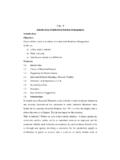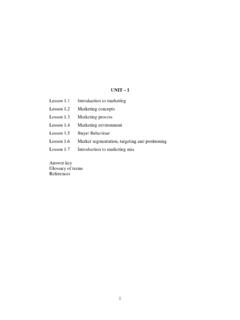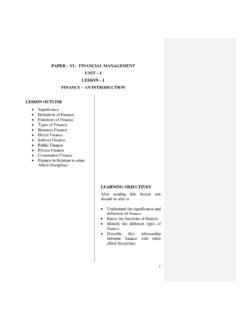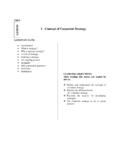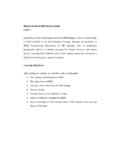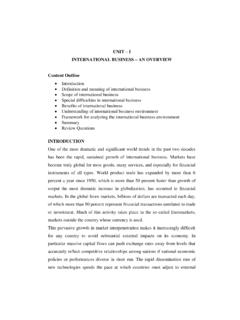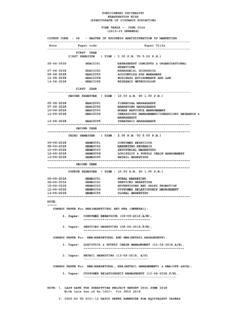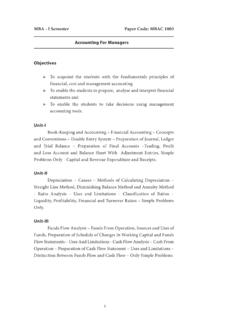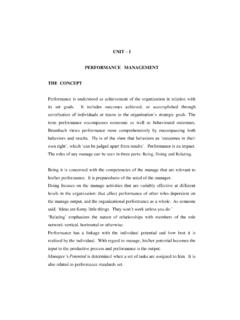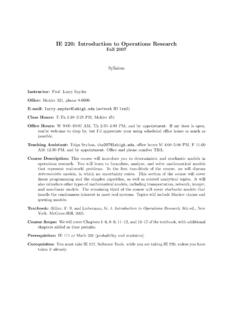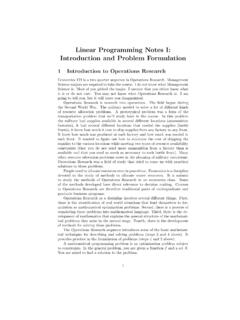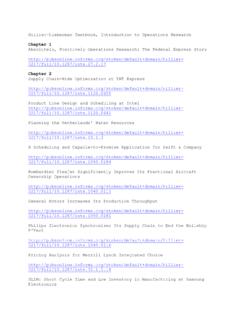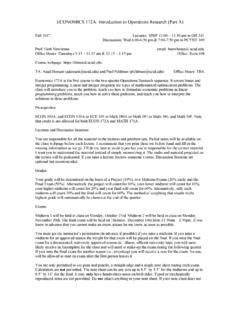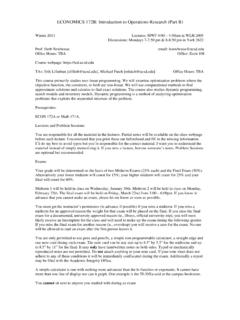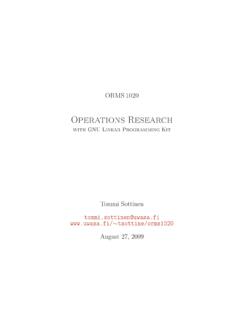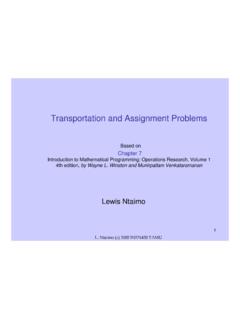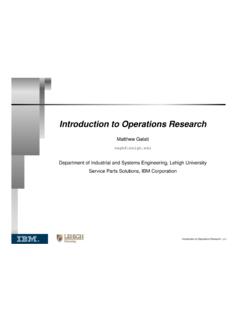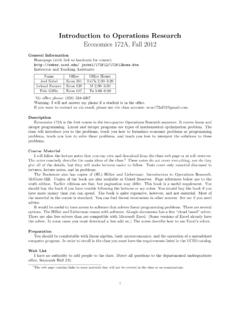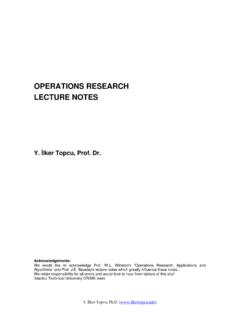Transcription of UNIT I INTRODUCTION TO OPERATIONS RESEARCH
1 MBA-H2040 Quantitative Techniques for Managers UNIT I 1 INTRODUCTION TO OPERATIONS RESEARCH LESSON STRUCTURE INTRODUCTION History of OPERATIONS RESEARCH Stages of Development of OPERATIONS RESEARCH Relationship Between Manager and OR Specialist OR Tools and Techniques Applications of OPERATIONS RESEARCH Limitations of OPERATIONS RESEARCH Summary Key Terms Self Assessment Questions Further References Objectives After Studying this lesson, you should be able to.
2 Understand the meaning, purpose, and tools of OPERATIONS RESEARCH Describe the history of OPERATIONS RESEARCH Describe the Stages of Explain the Applications of OPERATIONS RESEARCH Describe the Limitations of Operation RESEARCH Understand the OR specialist and Manager relationship LESSON MBA-H2040 Quantitative Techniques for Managers INTRODUCTION The British/Europeans refer to "operational RESEARCH ", the Americans to " OPERATIONS RESEARCH " - but both are often shortened to just "OR" - which is the term we will use.
3 Another term which is used for this field is "management science" ("MS"). The Americans sometimes combine the terms OR and MS together and say "OR/MS" or "ORMS". Yet other terms sometimes used are "industrial engineering" ("IE") and "decision science" ("DS"). In recent years there has been a move towards a standardization upon a single term for the field, namely the term "OR". Operation RESEARCH is a relatively new discipline. The contents and the boundaries of the OR are not yet fixed. Therefore, to give a formal definition of the term OPERATIONS RESEARCH is a difficult task.
4 The OR starts when mathematical and quantitative techniques are used to substantiate the decision being taken. The main activity of a manager is the decision making. In our daily life we make the decisions even without noticing them. The decisions are taken simply by common sense, judgment and expertise without using any mathematical or any other model in simple situations. But the decision we are concerned here with are complex and heavily responsible. Examples are public transportation network planning in a city having its own layout of factories, residential blocks or finding the appropriate product mix when there exists a large number of products with different profit contributions and production requirement etc.
5 OPERATIONS RESEARCH tools are not from any one discipline. OPERATIONS RESEARCH takes tools from different discipline such as mathematics, statistics, economics, psychology, engineering etc. and combines these tools to make a new set of knowledge for decision making. Today, became a professional discipline which deals with the application of scientific methods for making decision, and especially to the allocation of scarce resources. The main purpose of is to provide a rational basis for decisions making in the absence of complete information, because the systems composed of human, machine, and procedures may do not have complete information.
6 OPERATIONS RESEARCH can also be treated as science in the sense it describing, understanding and predicting the systems behaviour, especially man-machine system. Thus specialists are involved in three classical aspect of science, they are as follows: i) Determining the systems behaviour ii) Analyzing the systems behaviour by developing appropriate models iii) Predict the future behaviour using these models The emphasis on analysis of OPERATIONS as a whole distinguishes the from other RESEARCH and engineering. is an interdisciplinary discipline which provided solutions to problems of military OPERATIONS during World War II, and also successful in other OPERATIONS .
7 Today business applications are MBA-H2040 Quantitative Techniques for Managers primarily concerned with analysis for the possible alternative actions. The business and industry befitted from in the areas of inventory, reorder policies, optimum location and size of warehouses, advertising policies, etc. As stated earlier defining is a difficult task. The definitions stressed by various experts and Societies on the subject together enable us to know what is, and what it does.
8 They are as follows: 1. According to the Operational RESEARCH Society of Great Britain (OPERATIONAL RESEARCH QUARTERLY, l3(3):282, l962), Operational RESEARCH is the attack of modern science on complex problems arising in the direction and management of large systems of men, machines, materials and money in industry, business, government and defense. Its distinctive approach is to develop a scientific model of the system, incorporating measurements of factors such as change and risk, with which to predict and compare the outcomes of alternative decisions, strategies or controls.
9 The purpose is to help management determine its policy and actions scientifically. 2. Randy Robinson stresses that OPERATIONS RESEARCH is the application of scientific methods to improve the effectiveness of OPERATIONS , decisions and management. By means such as analyzing data, creating mathematical models and proposing innovative approaches, OPERATIONS RESEARCH professionals develop scientifically based information that gives insight and guides decision-making. They also develop related software, systems, services and products. 3. Morse and Kimball have stressed is a quantitative approach and described it as a scientific method of providing executive departments with a quantitative basis for decisions regarding the OPERATIONS under their control.
10 4. Saaty considers as tool of improving quality of answers. He says, is the art of giving bad answers to problems which otherwise have worse answers . 5. Miller and Starr state, is applied decision theory, which uses any scientific, mathematical or logical means to attempt to cope with the problems that confront the executive, when he tries to achieve a thorough-going rationality in dealing with his decision problem . 6. Pocock stresses that is an applied Science. He states is scientific methodology (analytical, mathematical, and quantitative) which by assessing the overall implication of various alternative courses of action in a management system provides an improved basis for management decisions.
